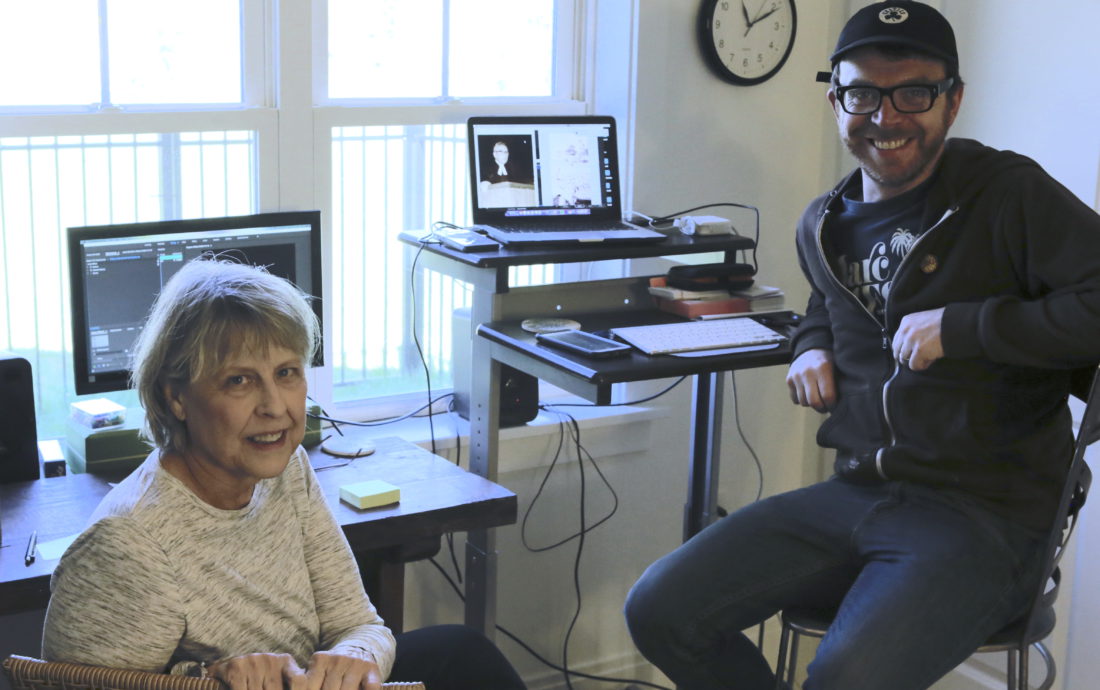Carolyn Crowder and Rod Murphy didn’t know each other before collaborating on At The River: Profiles in Quiet Courage. Now they wouldn’t mind if each new cinematic project they undertake is a joint effort.
The filmmakers’ 11-part documentary profile series about Presbyterian ministers in the Deep South who stood up to racism during the civil rights era — four chapters of which will be screened at the Fine Arts Theatre on Thursday, May 2 — has been a true partnership. For Murphy, a native New Englander who’s lived in Asheville the past 17 years and worked in film production for close to 20, it’s been an education in Southern history, the countless nuances of which he was largely unaware of before the work’s inception. For Crowder, an author and former psychologist raised in Montgomery, Ala., the process has been a means of reconnecting with her past and paying tribute to the figures who opened her eyes to a world of love and compassion for all people.
“I was raised in a very racist family. My mother was particularly vitriolic, and when I went to Auburn University, Daddy sent me there because he’d gone there and thought that my mind would not be tampered with,” Crowder says. “It was 1965, and the two [ministers] who were at the Presbyterian church in Auburn really moved me forward. … I was quite radicalized at Auburn.”
After moving to Idaho, Washington and Arizona, Crowder would tell friends about the white ministers speaking out from the pulpit, taking risks and challenging people. “There’s a feeling, I think, in the country that no white Southerner ever did a good thing during the civil rights movement, and I just knew it wasn’t true,” she says.
Crowder later retired to Montreat and realized she was “surrounded by the heroes of the church.” To honor these men and their colleagues, she initially envisioned a book-length project but was advised by a Tucson, Ariz.-based videographer friend that filmed interviews would be the best route. The goal then became to profile the four or five retired ministers she personally knew.
Murphy (recommended to Crowder by local cinematographer Dylan Trivette) arrived on the first day of shooting in late 2015 and soon sensed that more voices were needed to fully realize the project and share this little-known slice of history. Thanks to word-of-mouth interest via an enthusiastic network of Presbyterian ministers, the duo have since traveled throughout the Carolinas and into Kentucky, Virginia, Georgia and Alabama, conducting more than 50 interviews.
“I could do 25 more tomorrow just like that,” Crowder says. “Time is of the essence because these guys are elderly. The oldest guy we interviewed is now 97, and the youngest is about 80. We interviewed one woman who is 101 in Auburn who is the widow of a guy who was in Mississippi, and we’ve lost three since we started.”
Self-funding the project, Crowder says she took a cue from her psychology background and used the same four core questions for each interviewee to draw out their backgrounds, risks taken and motivations for their actions. The responses help paint the stunning circumstances of brave young men in their mid-20s — many of whom are North Carolina natives — who were automatically looked upon as community leaders. Examples of their daring actions include standing up for a black woman who lost her job, boycotting a summer camp until it was integrated and refusing to preach when Freedom Riders were barred from entering a church. All the while, the Ku Klux Klan threatened the ministers and their families.
The filmmakers say that while recounting the past in the informal chats at the ministers’ homes or the Heritage Center, the clergymen are modest. Many feel they should have done more, despite the fact that merely speaking out from the pulpit was deemed radical at the time.
“Carolyn has become a big character in it,” Murphy says. “Her story is paralleling their story, and if she wasn’t [adding her personal experiences], I don’t think they would be as comfortable to open up.”
The pair, who have already planned a follow-up film on animal theology and ethics, spend three days a week editing and are nearing completion on the overall project. The plan is to make the 11-part series of 20-minute profiles available for churches and seminaries. The hundreds of hours of raw footage will go to the Presbyterian Historical Society in Philadelphia and Montreat and an 80- to 90-minute film, intended for the general public, will be cut and entered in film festivals.
At the May 2 screening, profiles of Wallace Alston (Auburn, Ala.), Bob Walkup (Starkville, Miss.), Robert Miller (Tuskegee, Ala.) and Eade Anderson (Greenwood, Miss.) will be screened, and Anderson will participate in a post-screening Q&A with the filmmakers. There will also be singalongs with the film’s composer, Asheville-based pianist Aaron Price. If the event is anything like the previous screenings at White Horse Black Mountain and area churches, the filmmakers expect reactions ranging from rapt silence during the profiles to widespread cathartic weeping at their conclusions.
WHAT: At The River: Profiles in Quiet Courage
WHERE: The Fine Arts Theatre, 36 Biltmore Ave., fineartstheatre.com
WHEN: Thursday, May 2, 7 p.m. $10



Where may I get this film? I have been a Presbyterian most of my life and knew two of these ministers when I was younger.